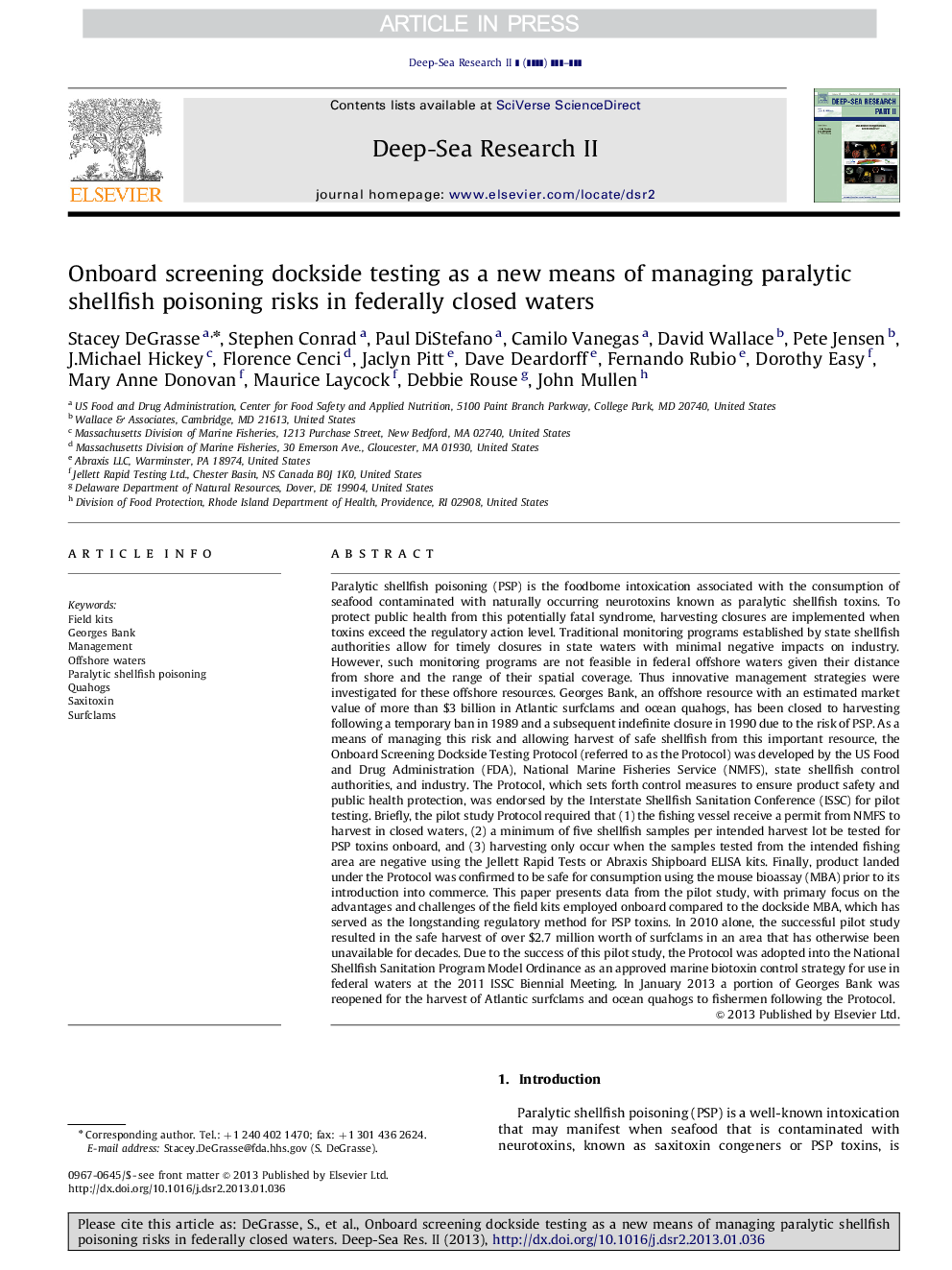| کد مقاله | کد نشریه | سال انتشار | مقاله انگلیسی | نسخه تمام متن |
|---|---|---|---|---|
| 6384237 | 1626437 | 2014 | 13 صفحه PDF | دانلود رایگان |
عنوان انگلیسی مقاله ISI
Onboard screening dockside testing as a new means of managing paralytic shellfish poisoning risks in federally closed waters
ترجمه فارسی عنوان
تست غربالگری به عنوان وسیله ای جدید برای مدیریت مسمومیت های مسمومیت پوستی فلج شده در آب های فدرال
دانلود مقاله + سفارش ترجمه
دانلود مقاله ISI انگلیسی
رایگان برای ایرانیان
کلمات کلیدی
موضوعات مرتبط
مهندسی و علوم پایه
علوم زمین و سیارات
زمین شناسی
چکیده انگلیسی
Paralytic shellfish poisoning (PSP) is the foodborne intoxication associated with the consumption of seafood contaminated with naturally occurring neurotoxins known as paralytic shellfish toxins. To protect public health from this potentially fatal syndrome, harvesting closures are implemented when toxins exceed the regulatory action level. Traditional monitoring programs established by state shellfish authorities allow for timely closures in state waters with minimal negative impacts on industry. However, such monitoring programs are not feasible in federal offshore waters given their distance from shore and the range of their spatial coverage. Thus innovative management strategies were investigated for these offshore resources. Georges Bank, an offshore resource with an estimated market value of more than $3 billion in Atlantic surfclams and ocean quahogs, has been closed to harvesting following a temporary ban in 1989 and a subsequent indefinite closure in 1990 due to the risk of PSP. As a means of managing this risk and allowing harvest of safe shellfish from this important resource, the Onboard Screening Dockside Testing Protocol (referred to as the Protocol) was developed by the US Food and Drug Administration (FDA), National Marine Fisheries Service (NMFS), state shellfish control authorities, and industry. The Protocol, which sets forth control measures to ensure product safety and public health protection, was endorsed by the Interstate Shellfish Sanitation Conference (ISSC) for pilot testing. Briefly, the pilot study Protocol required that (1) the fishing vessel receive a permit from NMFS to harvest in closed waters, (2) a minimum of five shellfish samples per intended harvest lot be tested for PSP toxins onboard, and (3) harvesting only occur when the samples tested from the intended fishing area are negative using the Jellett Rapid Tests or Abraxis Shipboard ELISA kits. Finally, product landed under the Protocol was confirmed to be safe for consumption using the mouse bioassay (MBA) prior to its introduction into commerce. This paper presents data from the pilot study, with primary focus on the advantages and challenges of the field kits employed onboard compared to the dockside MBA, which has served as the longstanding regulatory method for PSP toxins. In 2010 alone, the successful pilot study resulted in the safe harvest of over $2.7 million worth of surfclams in an area that has otherwise been unavailable for decades. Due to the success of this pilot study, the Protocol was adopted into the National Shellfish Sanitation Program Model Ordinance as an approved marine biotoxin control strategy for use in federal waters at the 2011 ISSC Biennial Meeting. In January 2013 a portion of Georges Bank was reopened for the harvest of Atlantic surfclams and ocean quahogs to fishermen following the Protocol.
ناشر
Database: Elsevier - ScienceDirect (ساینس دایرکت)
Journal: Deep Sea Research Part II: Topical Studies in Oceanography - Volume 103, May 2014, Pages 288-300
Journal: Deep Sea Research Part II: Topical Studies in Oceanography - Volume 103, May 2014, Pages 288-300
نویسندگان
Stacey DeGrasse, Stephen Conrad, Paul DiStefano, Camilo Vanegas, David Wallace, Pete Jensen, J.Michael Hickey, Florence Cenci, Jaclyn Pitt, Dave Deardorff, Fernando Rubio, Dorothy Easy, Mary Anne Donovan, Maurice Laycock, Debbie Rouse, John Mullen,
